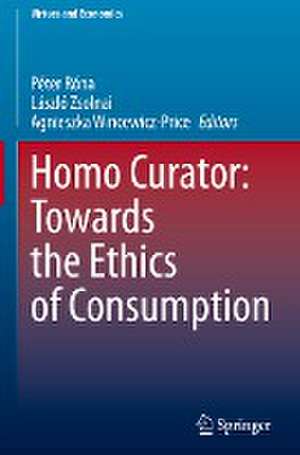Homo Curator: Towards the Ethics of Consumption: Virtues and Economics, cartea 8
Editat de Péter Róna, László Zsolnai, Agnieszka Wincewicz-Priceen Limba Engleză Hardback – 21 feb 2024
Preț: 947.35 lei
Preț vechi: 1155.30 lei
-18% Nou
Puncte Express: 1421
Preț estimativ în valută:
181.27€ • 197.53$ • 152.75£
181.27€ • 197.53$ • 152.75£
Carte disponibilă
Livrare economică 02-16 aprilie
Preluare comenzi: 021 569.72.76
Specificații
ISBN-13: 9783031516993
ISBN-10: 3031516990
Pagini: 200
Ilustrații: XIV, 200 p. 15 illus., 8 illus. in color.
Dimensiuni: 155 x 235 mm
Greutate: 0.5 kg
Ediția:2024
Editura: Springer Nature Switzerland
Colecția Springer
Seria Virtues and Economics
Locul publicării:Cham, Switzerland
ISBN-10: 3031516990
Pagini: 200
Ilustrații: XIV, 200 p. 15 illus., 8 illus. in color.
Dimensiuni: 155 x 235 mm
Greutate: 0.5 kg
Ediția:2024
Editura: Springer Nature Switzerland
Colecția Springer
Seria Virtues and Economics
Locul publicării:Cham, Switzerland
Cuprins
Introduction.- Part I: From gluttony and avarice to moderation and virtue.- Chapter 1. Blessed are the Gentle (Joshtrom Kureethadam).- Chapter 2. Avarice in post-modern society (Stefano Zamagni).- Chapter 3. What is Enough (Margaret Atkins).- Chapter 4. Buddhism and the Right Consumption (Laszlo Zsolnai).- Chapter 5. Good consumption in the perspective of Thomistic Personalism (Laura Baritz).- Part II : Is mainstream economics to blame?.- Chapter 6. Political Economy, Moral Reasoning and Global Warming (David Rose).- Chapter 7. A Critical Approach to Critiquing Economics (Geoffrey Brennan, Hayden Wilkinson).- Chapter 8. Response from Peter Róna.- Chapter 9. Economics and three faces of prudence (Edward Skidelsky).- Part III: Way forward.- Chapter 10. Social Trust, Virtue, and Market Coordination (Dominic Burbidge).- Chapter 11. A Deeper Humanity: The Family as the School of an Inclusive Economy (Joseph Rice).- Chapter 12. A radically new way to tune compound interest and its implications (Eors Szathmary).
Notă biografică
Peter Róna is Fellow of Blackfriars Hall and Director of Las Casas Institute's Economics Programme, University of Oxford, where he teaches courses in economics and the philosophical foundations of the social sciences. He obtained his B.A. degree in economic history (cum laude) from the University of Pennsylvania and his law degree from Oxford University (First Class) in 1964. His published articles include a study of the Euro and an examination of the philosophical foundations of economics. Editor of Springer’s Virtues and Economics series.
Laszlo Zsolnai is Professor and Director of the Business Ethics Center at the Corvinus University of Budapest. He is Associate Member of the Las Casas Institute, Blackfriars Hall, University of Oxford, and President of the European SPES Institute in Leuven, Belgium. Co-editor of Springer’s Virtues and Economics series.
Agnieszka Wincewicz-Price is head of Behavioural Economics at the Polish Economic Institute in Warsaw (Poland) and Junior Research Fellow in Las Casas Institute’s Economics Programme, University of Oxford. Graduate of Warsaw School of Economics, Erasmus Universiteit in Rotterdam (EIPE) and Newcastle University where she received her PhD in political economy. Member of the Polish Philosophy of Economics Network.
Laszlo Zsolnai is Professor and Director of the Business Ethics Center at the Corvinus University of Budapest. He is Associate Member of the Las Casas Institute, Blackfriars Hall, University of Oxford, and President of the European SPES Institute in Leuven, Belgium. Co-editor of Springer’s Virtues and Economics series.
Agnieszka Wincewicz-Price is head of Behavioural Economics at the Polish Economic Institute in Warsaw (Poland) and Junior Research Fellow in Las Casas Institute’s Economics Programme, University of Oxford. Graduate of Warsaw School of Economics, Erasmus Universiteit in Rotterdam (EIPE) and Newcastle University where she received her PhD in political economy. Member of the Polish Philosophy of Economics Network.
Textul de pe ultima copertă
This book explores the under-researched sources of the consumerist culture and the environmental damage it has brought about. The book is an outcome of the symposium on “The Ethics of Consumption” organised and hosted by the Las Casas Institute at the Blackfriars Hall, University of Oxford as part of its Economics as a Moral Science Programme. It takes on two contemporary problems: the human weakness and capacity for wrong-doing, and the failure of modern economic theory to account for the moral character of human behaviour and its implicit encouragement of gluttonous life-styles. In a time when grand political schemes are proposed to revive sustainability of global economy, the authors of the papers collected in this book highlight the need for moral renewal without which the most revolutionary structural reforms are bound to fail at producing the desired outcome. Topics of the book include the meaning and sources of avarice, the attempt to define what is enough, exploration of philosophical and theological perspectives which can serve as building blocks for the ethics of consumption. This makes the book of great interest to a broad readership of economists, social scientists and philosophers.
Caracteristici
Presents novel insights into today’s academic and political attempts to address the environmental crisis Shows why the boldest structural reforms won't solve the environmental crisis until its deepest sources are recognised Facilitates the academic and political dialogue between humanities and economics







